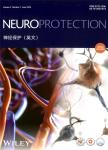Preserving cognitive function in patients with Alzheimer's disease:The Alzheimer's disease neuroprotection research initiative(ADNRI)
作者机构:Department of NeurologyDaping HospitalThird Military Medical UniversityChongqingChina Chongqing Key Laboratory of Ageing and Brain DiseasesChongqingChina Division of Experimental CardiologyDepartment of CardiologyErasmus MCUniversity Medical CenterRotterdamThe Netherlands Institute of Brain and IntelligenceThird Military Medical UniversityChongqingChina Guangdong-HongKong-Macao Institute of CNS Regeneration(GHMICR)Jinan UniversityGuangzhouGuangdongChina Institute of Biomedical SciencesFederal University of Rio de JaneiroRio de JaneiroRio de JaneiroBrazil Fujian Key Laboratory of Molecular NeurologyDepartment of Neurology and GeriatricsFujian Institute of GeriatricsFujian Medical University Union HospitalInstitute of NeuroscienceFujian Medical UniversityFuzhouFujianChina Guangyang Bay LaboratoryChongqing Institute for Brain and IntelligenceChongqingChina Center for Excellence in Brain Science and Intelligence TechnologyChinese Academy of SciencesShanghaiChina Department of AnatomyBrain Health Research Centre and Brain Research New ZealandUniversity of OtagoDunedinNew Zealand School of Life SciencesUniversity of NottinghamNottinghamUK Brain and Mind Centre&School of Medical SciencesThe University of SydneySydneyNew South WalesAustralia Innovation Center for Neurological Disorders and Department of NeurologyXuanwu HospitalNational Clinical Research Center for Geriatric DiseasesCapital Medical UniversityBeijingChina A.I.Virtanen Institute for Molecular SciencesUniversity of Eastern FinlandKuopioFinland Department of Neurology and PsychiatryBeijing Shijitan HospitalCapital Medical UniversityBeijingChina Department of Diagnostic Radiology and Nuclear MedicineUniversity of Maryland School of MedicineBaltimoreMarylandUSA University of Chinese Academy of SciencesBeijingChina State Key Laboratory of Membrane BiologyInstitute of ZoologyChinese Academy of SciencesBeijingChina Beijing Institute of Brain DisordersLaboratory of Brain DisordersMinistry of Science and TechnologyCollaborative Innovation Center for Brain DisordersCapital Medical UniversityBeijingChina Institute for Cell EngineeringDepartment of NeurologyThe Johns Hopkins University School of MedicineBaltimoreMarylandUSA B's Research GroupI3Bs-Research Institute on BiomaterialsBiodegradables and BiomimeticsHeadquarters of the European Institute of Excellence on Tissue Engineering and Regenerative MedicineUniversity of MinhoGuimarãesPortugal ICVS/3B's-PT Government Associate LaboratoryBraga/GuimarãesPortugal Department of BioengineeringMcGowan Institute for Regenerative MedicineUniversity of PittsburghPittsburghPennsylvaniaUSA Department of RadiologyMcGowan Institute for Regenerative MedicineUniversity of PittsburghPittsburghPennsylvaniaUSA Magnetic Resonance Imaging LaboratoryCIC BiomaGUNE Research CenterBasque Research and Technology Alliance(BRTA)Donostia-San SebastianSpain Laboratory for Experimental Brain ResearchDivision of NeurosurgeryDepartment of Clinical SciencesLund UniversityLundSweden Institute of AgingKey Laboratory of Alzheimer's Disease of Zhejiang Province.Zhejiang Clinical Research Center for Mental DisordersSchool of Mental Health and The Affiliated Kangning HospitalOujiang Laboratory(Zhejiang Lab for Regenerative MedicineVision and Brain Health)Wenzhou Medical UniversityZhejiangChina School of Optometry and Vision ScienceUniversity of New South WalesSydneyNew South WalesAustralia Neuroscience Research InstituteDepartment of NeurobiologySchool of BasicMedical SciencesKey Laboratory for NeuroscienceMinistry of Education/NationalHealth Commission and State Key Laboratory of Natural and Biomimetic DrugsPeking UniversityBeijingChina PKU-IDG/McGovern Institute for Brain ResearchPeking UniversityBeijingChina Department of NeurobiologyBeijing Institute of Basic Medical SciencesBeijingChina Shanghai Key Laboratory of Anesthesiology and Brain Functional ModulationClinical Research Center for Anesthesiology and Perioperative MedicineTranslational Research Institute of Brain and Brain-Like IntelligenceShanghai Fourth People's HospitalSchool of MedicineTongji UniversityShanghaiChina Department of NeurologyThe First Hospital of Jilin UniversityChang ChunJilinChina Faculty of Life and Health SciencesBrain Cognition and Brain Disease Institute(BCBDI)Shenzhen Institute of Advanced TechnologyShenzhenChina State Key Laboratory of Medical Neurobiology and MOE Frontiers Center for Brain ScienceDepartment of Neurology and Institute of NeurologyHuashan HospitalShanghai Medical CollegeFudan UniversityShanghaiChina Division of Health SciencesSchool of Pharmacy and Medical Sciences and Sansom InstituteUniversity of South AustraliaAdelaideSouth AustraliaAustralia Suzhou Auzone BiotechSuzhouJiangsuChina Department of Pharmaceutical SciencesDivision of Pharmacology and ToxicologyUniversity of ViennaViennaAustria The Florey InstituteThe University of MelbourneParkvilleVictoriaAustralia School of Life SciencesThe University of WarwickCoventryUK Department of NeurosurgeryXuanwu HospitalCapital Medical UniversityBeijingChina
出 版 物:《Neuroprotection》 (神经保护(英文))
年 卷 期:2023年第1卷第2期
页 面:84-98页
学科分类:1002[医学-临床医学] 100203[医学-老年医学] 10[医学]
基 金:National Natural Science Foundation of China,Grant/Award Numbers:92249305,82120108010,81930028,31921003 Academy of Medical Sciences(Newton Advanced Fellowship),Grant/Award Number:NAF/R11/1010 National Institutes of Health,Grant/Award Number:R01DA056739
主 题:Alzheimer's disease early intervention neural regeneration neuroprotection systematic perspective
摘 要:The global trend toward aging populations has resulted in an increase in the occurrence of Alzheimer s disease(AD)and associated socioeconomic *** metabolism of amyloid-β(Aβ)has been proposed as a significant pathomechanism in AD,supported by results of recent clinical trials using anti-Aβ***,the cognitive benefits of the current treatments are *** etiology of AD is multifactorial,encompassing Aβand tau accumulation,neuroinflammation,demyelination,vascular dysfunction,and comorbidities,which collectively lead to widespread neurodegeneration in the brain and cognitive ***,solely removing Aβfrom the brain may be insufficient to combat neurodegeneration and preserve *** attain effective treatment for AD,it is necessary to(1)conduct extensive research on various mechanisms that cause neurodegeneration,including advances in neuroimaging techniques for earlier detection and a more precise characterization of molecular events at scales ranging from cellular to the full system level;(2)identify neuroprotective intervention targets against different neurodegeneration mechanisms;and(3)discover novel and optimal combinations of neuroprotective intervention strategies to maintain cognitive function in AD *** Alzheimer s Disease Neuroprotection Research Initiative s objective is to facilitate coordinated,multidisciplinary efforts to develop systemic neuroprotective strategies to combat *** aim is to achieve mitigation of the full spectrum of pathological processes underlying AD,with the goal of halting or even reversing cognitive decline.



